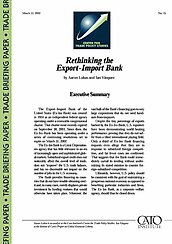The Ex-Im Bank is a Great Depression-era agency that has little relevance in an era of increasingly open and sophisticated global markets. Subsidized export credit does not noticeably affect the overall level of trade, does not “improve” the U.S. trade balance, and has no discernable net impact on the number of jobs in the U.S. economy.
The Bank provides financing to countries that do not have trouble obtaining credit and, in many cases, merely displaces private investment by funding ventures that would otherwise have taken place. Moreover, the vast bulk of the Bank’s financing goes to very large corporations that do not need handouts from taxpayers.
Despite the tiny percentage of exports backed by the Ex-Im Bank, U.S. exporters have been demonstrating world-beating performance, proving that they do not suffer from a tilted international playing field. Only a third of Ex-Im Bank financing requests even allege that they are in response to subsidized foreign competition, and far fewer cases are confirmed. That suggests that the Bank could immediately curtail its lending without undermining its stated mission to counter foreign-subsidized competition.
Ultimately, however, U.S. policy should be consistent with the goal of maintaining a prosperous national economy as opposed to benefiting particular industries and firms. The Ex-Im Bank, as a corporate-welfare agency, should thus be closed down.



